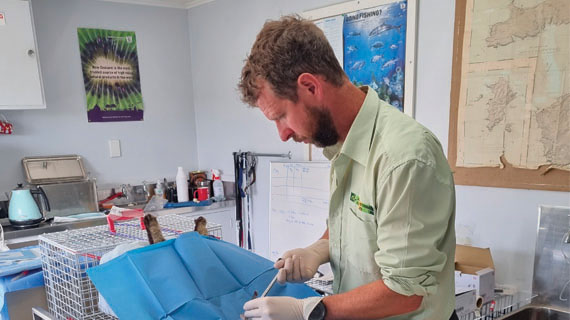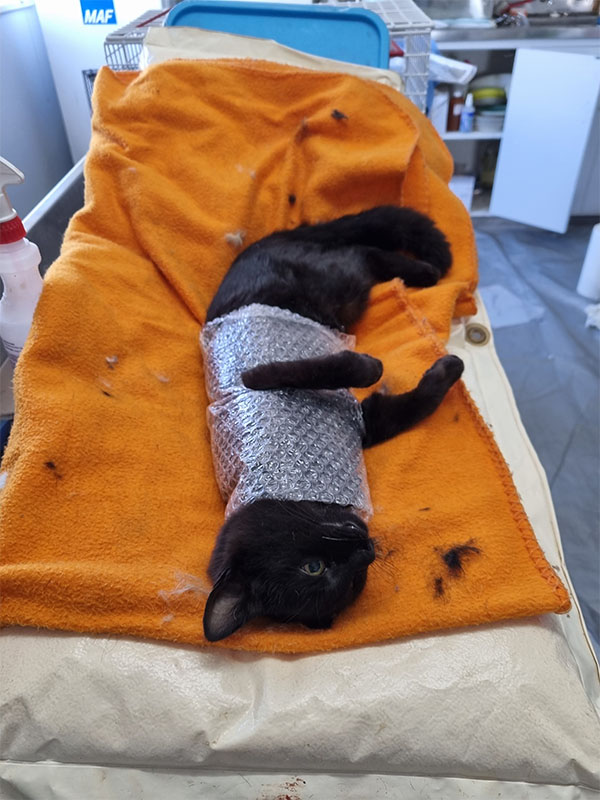Safer pets, safer wildlife
When Aorangi Vets visited earlier in the year, a collaborative effort between the Chatham Islands Council/Environment Canterbury, the Chatham Landscape Restoration Trust, and DOC enabled for a free cat desexing service to be offered to the community.

Vet Aaron doing a surgery.
The service was widely taken up and resulted in a productive visit. In total, 32 cats were neutered, which was more than a 100% increase on the two previous years. These numbers prove that by removing the financial barriers from a community already paying over the odds on their living costs, there is huge support for protecting both their beloved pets and our native wildlife. The total costs were $5035.50, with $1000 from DOC and the remainder split between Chatham Islands Council/Environment Canterbury and the Chatham Landscape Restoration Trust. The plan is to offer this service for future cat visits so if you were unable to book in with the vet on the last trip then keep an eye out for their next visit.
If you are on the fence and wondering what the pros might be to having your pet cat desexed, the benefits are twofold, with both our unique native wildlife and our pets themselves both benefiting from the surgery.
Why are cats a problem?
We are lucky to have no mustelids (stoats, weasels, ferrets) on our islands and this means that feral cats are the apex predator to our native wildlife. As efforts increase to remove the feral cat population, having your pet cat desexed can have a great impact on the feral population. On average, a female pet cat can begin their reproductive lives at 4-5 months old and is capable of giving birth to three litters of cats per year and can have 4-6 kittens per litter. With an average productive life of 13 years, this means your pet cat could give birth to up to 234 kittens in its lifetime. When we extrapolate this out, it has been calculated that, in just seven years, one female cat and her offspring can produce as many as 420,000 kittens. This problem highlights the importance of desexing pets at an early age and reducing the number of unwanted animals in our communities.

The patients are put in a custom 'bubble wrap recovery suit’ to keep them warm and help them recover.
The benefits of desexing your cat
Our pets and therefore their owners also benefit greatly from the procedure for the following reasons:
- Zero unwanted litters – we all know how hard it is to find homes for every kitten our pet cats have, and that leaves the unpleasant job of euthanising those not lucky enough to find homes.
- Reduce unwanted territorial urine spraying. Your desexed cat is less inclined to mark their territory through urination – this is often around or underneath your house or in your gardens.
- Reduce unwanted aggression from other cats – your desexed cat is less likely to experience cat fight related injuries and diseases like bites, abscesses and Feline Immunodeficiency Virus (FIV).
- Stop unwanted cats coming on to your property when your cat is on heat – further reducing the potential for fights or worse.
- Reduce your cat wandering on the roads in search of a mate on heat – cats can roam large distances and this can therefore also keep them safe from traffic, dogs and any potential traps that people may have set in the area targeting wild populations.
- Reduce your cat’s chance of major health issues later in life like mammary and prostate tumours and uterine infections.
- Reduce your cat’s risk of cancer – males of getting testicular cancer and females of getting of breast cancer.
- Lengthen your cat’s life – a desexed cat is likely to live a longer, healthier life.
The plan is to offer this service for future cat visits so if you were unable to book in with the vet on the last trip then keep an eye out for their next visit. To get your name added to the list for next time please get in touch with Hamish Chisholm.
